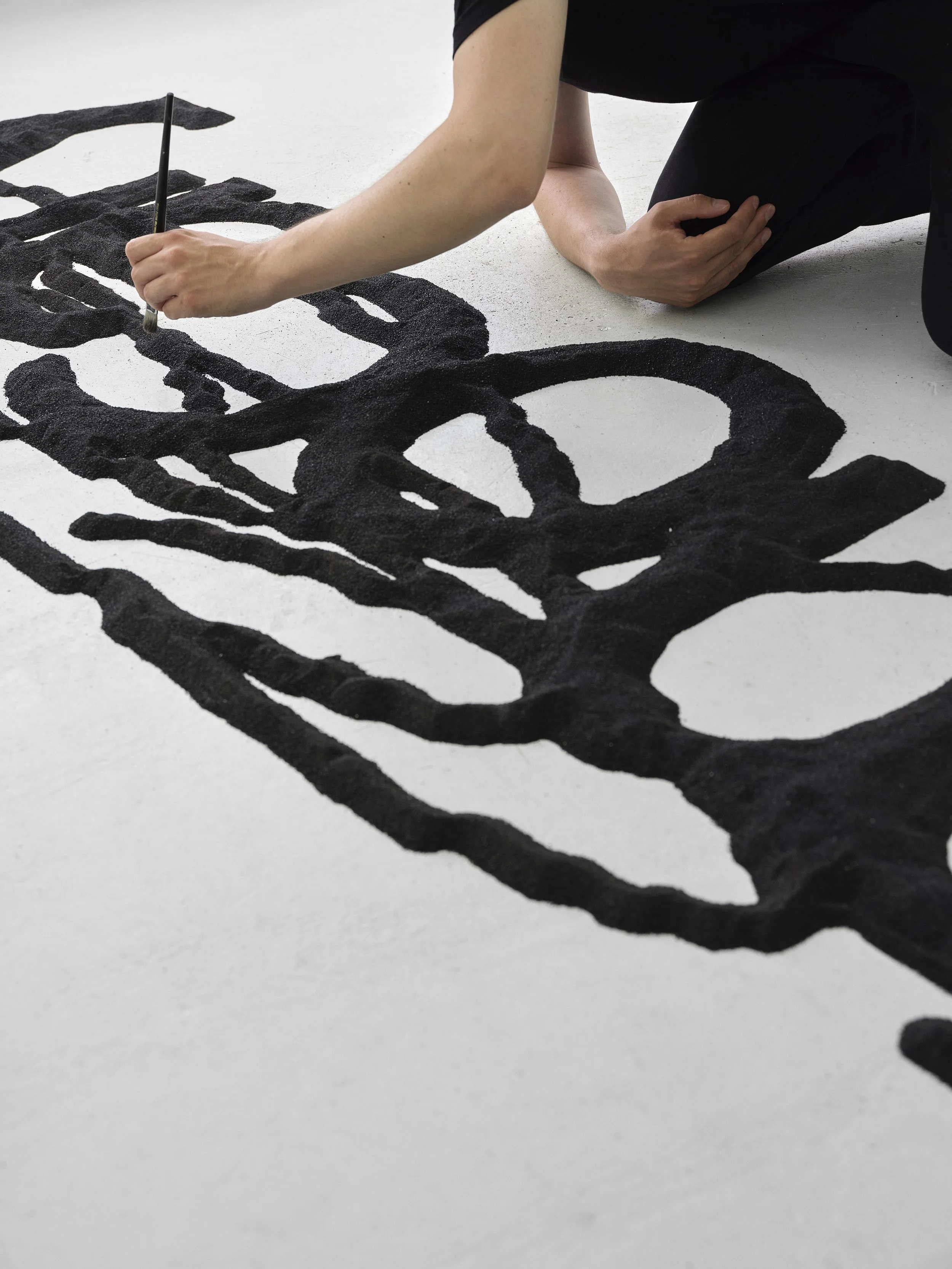Andreas Albrectsen b.1986, Copenhagen.
What value does drawing possess in an era when computers can recreate the touch of the human hand and fashion a work of art? How can human creativity compare to the advance of artificial intelligence? Andreas Albrectsen’s work tussles with these dilemmas and exposes the conceptual frictions that lie between the digital and human realms. In his measured, monochrome drawings, Albrectsen harnesses motifs that are often associated with computer systems—the arrows of weather patterns on a meteorological report; the folders of a desktop; the word puzzles of a reCAPTCHA.
The reclamation of these images, symbols and words is something of a rebellious act by Albrectsen against the powers of Big Tech. Now returned to the human hand, these motifs are charged with the resonance of having been translated between media. While the expansion of empires was once the demonstration of power, it seems the colonization of data and digital territory is now the marker of influence. We might think of the growing dangers of deepfakes and bots, who feed false information to human users to the detriment of fair elections.
In the case of the Recapture series, which return the nonsense fragments of scanned books to the tactile page, Albrectsen draws attention to the relationship between the human user and computer system. While the user performs the required task of deciphering words to prove their humanity, they simultaneously improve the intelligence of the software. Albrectsen’s drawings interrupt this exchange, however, highlighting the shadowy intentions behind a reCAPTCHA—their benefits and their hidden costs. While the result of a reCAPTCHA is to digitize archives and make these accessible to a human audience, they are often carried out blithely without understanding how information will be used. Human knowledge and data are bestowed unknowingly. The absurd poems that appear in Albrectsen’s Recapture works speak to this farcical truth.
Albrectsen’s drawings discuss the way in which information is disseminated and processed. Through the lens of the computer screen, human experience is diluted and distilled into something unemotional and detached. The representation of tempests, for example, as a collection of arrows and lines forges a distance between the audience and the true impact of a storm upon human life. Equally, desktop folders are a place in which sensitive information is archived, to be retrieved in the future or forgotten. In Albrectsen’s Untitled (Folders) series, these dossiers are superimposed over alpine ranges and sand dunes which mimic screensaver backgrounds. Albrectsen makes us consider how information is gathered by Big Tech and used at times without our knowledge; how quickly we fashion our digital identities and how long the residue of those profiles lingers on.
The decision by Albrectsen to work with paper, charcoal and pencil is weighted in both art historical and quotidian significance—these are the tools of preliminary observations and unconscious outpourings, as well as the humble utensils of everyday life. Indeed, art history and its essential relationship to human creativity is an anchor in Albrectsen’s work. The computer screen is reimagined here as a new kind of vanitas painting—a warning against the transience of life, but also its emptiness when experienced purely online. The distinctly human nature of drawing contrasts with the objectivity of the digital imagery that Albrectsen employs.
The migration between the human and digital, conceptual and material is vital to Albrectsen’s practice. In the midst of this oscillation is a discussion of modern life and the longing for connection. His drawings can be seen to facilitate and disrupt such connections, echoing the way in which a computer allows people to speak across continents via high-speed fibre-optic, but also create physical distance between interlocutors. With his own mixed Danish and Brazilian heritage, Albrectsen views this longing for connection as integral, inviting a dialogue between the two sides of his personality, as well as the digital and human. - Alice Godwin
Andreas Albrectsen is a Danish / Brazilian artist based in Copenhagen. He graduated from the Gerrit Rietveld Academie, Amsterdam, in 2011 & Malmö Art Academy in 2013. His work has been shown in venues such as: Malmö Konsthall, Skissernas Museum, ARoS Art Museum, Château de Montosorrot – Museum of Contemporary Art, SMK – The National Gallery of Denmark, Haus N Athens, Fotografisk Centre (DK). Albrectsen’s work is represented in the museum collections of the MNBA – The National Museum of Fine Arts of Brazil, SMK Museum - The National Gallery of Denmark, Malmö Art Museum, Sweden, The New Carlsberg Foundation, The Danish Arts Foundation, as well as private and public collections across Europe and Brazil.
